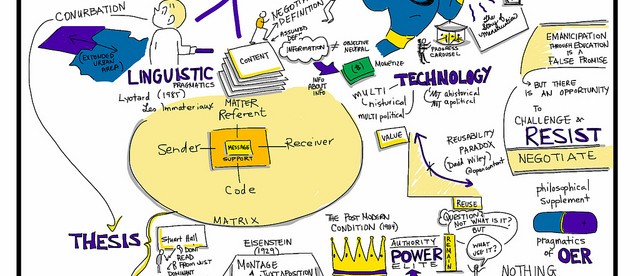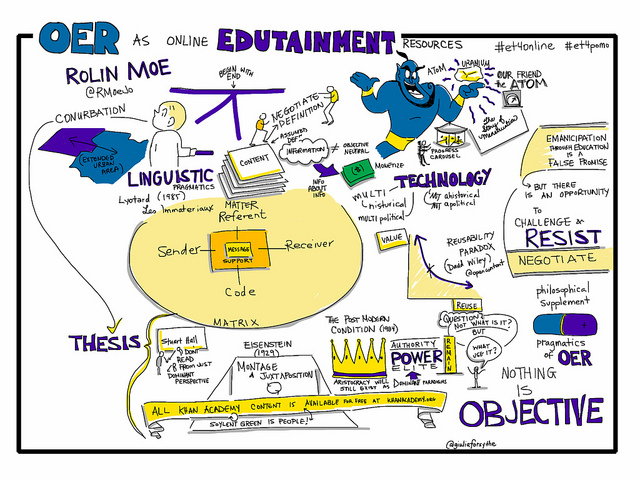A Philosophical Supplement to the OER Movement: Thoughts on #ET4Online Presentation
On Thursday, I had the opportunity to present on my OER/Edutainment/Postmodernism/Branded Digital Content research at the OLC Conference on Emerging Technologies (colloquially known as #et4online). The presentation was an extension of my recent publication on OER as Online Edutainment Resources at Learning, Media & Technology; I look at scholarship as fluid and transitory, so this was an opportunity to illuminate and further the conversation.
I am overwhelmed by the response to the presentation. Turnout to the talk was high, conversation on social media was lively, and the next morning there seems to be a good half-life to the session’s fallout (I included an edutainment clip where a man holds Uranium and refers to Uranium as a genie in a bottle whose purpose is to grant humanity 3 wishes). This is especially promising because this specific topic has a history of rejection at other conferences — to that end, I want to again thank #et4online and the people behind the special issue of Learning, Media & Technology for taking a chance on a diffuse topic that does not fit the traditional models of conference presentations and journal scholarship.
Why is this a problematic topic? I see several reasons: the difficulty of readily defining postmodernism, the *theoretical-as-theoretical* rather than providing a proof of concept and perhaps tacking a theoretical construct alongside, a field (OER) dedicated to pragmatics over ideology, a longstanding education narrative of emancipation and equity as our Goal/Ideal/Endpoint. Starting a conversation with “Education will not emancipate us; emancipation is a false promise and we continue to build systems and structures and policies on such falsehoods” is a big statement and requires a lot of thought and attention, thought and attention difficult to quantify into the word count for a presentation abstract. One of the feedback points from Thursday’s conversation was an opportunity to spend more time on the presentation and the topic; 50 minutes was really just a fly-by and more analysis is needed.
Hopefully in the weeks ahead I will take the presentation and develop a more domain-based resource from the slide deck (the media files were embedded, resulting in a 66MB ), something with the opportunity for greater discussion and communication. I continue to propose sessions on this topic at various conferences, and I have an interest in branching beyond the EdTech sphere into other spaces (general education, philosophy, policy & practice). As I noted in the presentation, this research is at a similar point as Harold found himself in Harold and the Purple Crayon when he draws the path *forward* and realizes it goes nowhere; it is time to exit the path and really begin the exploration and the journey.
On a personal note, it was excellent to see the brain trust that makes up #et4online every year. This includes the friends and colleagues I have made over the years (@acroom, @jessifer, @laurapasquini, @cmmattia, @slamteacher, @jleafstedt, @amichaelberman, @googleguacamole, @linvillemichael, @acollier, @rswharton, @krisshaffer, @whitneykilgore, @clhendricksbc, @allistelling, @kristi_oneal, @brocansky, @doublem44, @profrehn and others I am sure I am unfortunately omitting), those I have followed from afar who I had the opportunity to finally meet (@cogdog, @giuliaforsythe, @jrdingwall, @bonstewart et al) and people I met for the first time and will follow (@opengallant, @kreshelman, @taevans, @mgoudz, @kevinkelly0 and more). I look forward to future meetings!



Your talk on post-modernism has sparked some conversation on a Saturday morning at the Kilgore household on how we can make the notion of post-modernism easier to understand for those who are new to the idea. Rebecca will be following up with you on a “killer” idea.
Your session inspired me to do some research where I found several things that I can include in either papers I’m working on now or my dissertation. Thanks!!
Thanks, Whitney! Let me know where your research leads you!
This qualifies as a tease, doesn’t it? Or a “wish you were here” postcard?
Sounds like there could be a chain reaction from your talk. At the epicentre, pedagogues whose brains have been blown can carry some of the (brain/radio)activity to a broader circle. Then, this wider circle carries the signs of contagion, with such diseases of the mind as critical thinking about OER as edutainment.
Eventually, the term “open” might be taken in a nuanced way and OERs will take on the kind of boring usefulness of something we take for granted. Does the new normal including two-headed fish?
As for reasons why the topic may not receive as much attention elsewhere might have to do with what may be the prevailing attitude among people who are trying to “get something done”. Namely that constructive feedback is welcomed when it leads to further action. I’m hedging because it can sound like an accusation. Yet it makes a lot of sense that some people would get defensive if they perceive a certain discourse to be a threat to their main mode of action. Not saying that people in the OER sphere would likely have this response to discussion of their work as edutainment. But it’d make sense that some well-intentioned people trying to further Open Education would be wary of anything which sounds like “openwashing”.
It sounds like your presentation was in no way inflammatory or confrontational. Not surprising given your overall attitude to such issues. But I could hear someone reacting viscerally to the title itself.
Really wish we had been there to partake in all that fun. But your followups are going to be pretty useful as well.